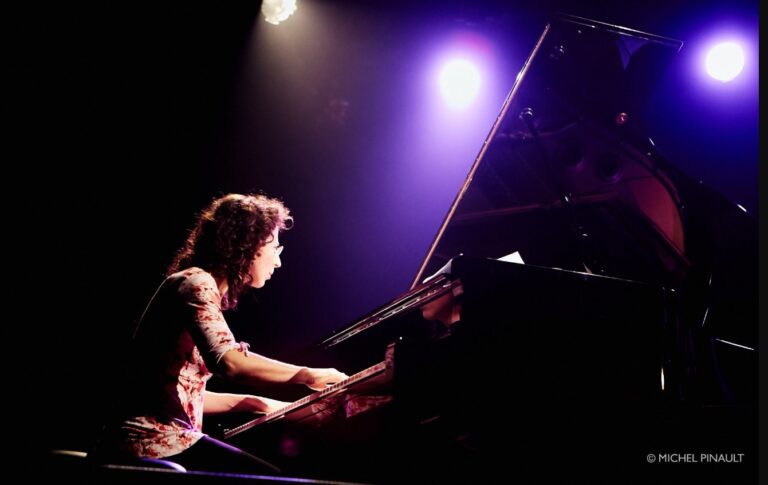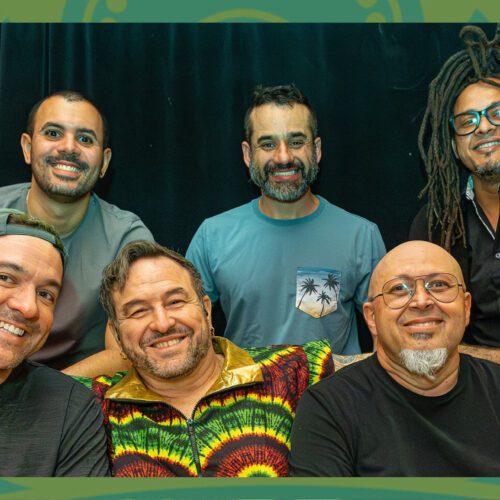Additional Information
Freed for a time during the pandemic, pianist Marianne Trudel soon returned to her lifestyle immersed in an insatiable passion for music, matched by the workaholism she’s known for : this autumn she’s releasing 3 albums that she visualizes as a triangle : solo À pas de loup, duo Dédé Java Espiritu with the excellent drummer and professor emeritus John Hollenbeck, Trio Time Poem : La joie de l’éphémère with the same percussionist colleague and bassist / double bassist Rémi-Jean Leblanc. The great and full nature, the total fragility of existence, loss, the celebration of life are the pieces of the pianistic and compositional engine perfected by the 46-year-old jazzwoman, composer, improviser, arranger, bandleader, producer, undoubtedly one of the most dynamic on the Montreal scene.
PAN M 360 : Commemoration, therefore.
Marianne Trudel: It’s a bit of a pretext, because these three albums were conceived in the same period, the famous pandemic. I was waiting for the concerts to start up again. A series of concerts with John (Hollenbeck) had been postponed three times, a series of trio concerts had also been postponed a few times. In short, I was teaching online, waiting for activities to resume. At the same time, I set out to finish a doctorate I’d started ten years ago, but had put on hold because I was too busy with concerts and teaching. I’d been given a final ultimatum (after ten years, you have to file), and it was getting on my nerves.
PAN M 360: If we understand correctly, several factors delayed the release of these albums.
Marianne Trudel: It might have been a good idea to release them a few months apart, but at a certain point, I said to myself “It’s so three”, I really see them as a triangle, as three important points in the same patent. It’s three facets, three complements, I’m not sure. But they go together in my head, even if they’re very different. They’re all very nature-inspired, with John as the linking element between the duo and the trio. I said to myself, “If I’m going to go into debt, I’m going to go into debt for real, let’s go! I normally only release one at a time, but here I thought, “Here, this could be fun.”
PAN M 360: So there’s a duo, a trio and… À pas de loup
Marianne Trudel: A solo album, yes. I wanted to dare something with slowed-down, enveloping music, a little less jazz. It’s not a full-blown jazz album, these compositions are at the crossroads of classical music, contemporary music, jazz of course and other patents. It was important for me to do things this way, because I felt I was being bombarded from all sides. I needed a shelter, and I wanted to share that shelter.
PAN M 360: Minimalist, calm, this album is indeed a refuge on the borders of silence.
Marianne Trudel: I’m in love with silence, maybe it’s a paradox. Ever since I was a child, I’ve needed silence, I love silence. Sometimes it’s confronting as a musician: you want to create, to contribute something, and at the same time, you already find the world quite noisy. So you need this reset. The title of my solo album is À pas de loup and the subtitle is Quiet sound for a loud world. It’s really in a spirit of calm, gentleness and delicacy. I wanted something that vibrated on a different frequency. We slow down the engine and listen to ourselves think.
PAN M 360: There’s mostly piano in À pas de loup, but there’s also harmonium.
Marianne Trudel: The instrument was in Pierre Marchand’s studio. Usually, harmoniums are much smaller, maybe three octaves, but this one was really 88 notes, I’ve never seen such a harmonium. I sit at this instrument with the pedals, the bellows system and all that. The feeling I got after three seconds! I just started pedaling on it and let the sound come out. It was so enveloping, so reassuring. I said to the sound engineer, “Let’s go, get your mics out!
PAN M 360: And then the piano-percussion duo with John Hollenbeck, Dédé Java Espiritu, whose material is being played these days.
.
Marianne Trudel: There’s a lot of improvisation in our music. It goes in all directions. There’s super melodic stuff, there’s super groovy stuff, there’s noisier, freer, more experimental stuff. John and I have developed a great musical complicity together.
PAN M 360: And then there’s the trio: Time Poem: la joie de l’éphémère.
Marianne Trudel: It’s with John Hollenbeck, drums, who’s a bit of a binder for my projects, and Rémi-Jean Leblanc, double bass and electric bass. With me, he’d always played only double bass, but this time, I wanted both, and it’s super fun too, super bright.
PAN M 360: This album is the first to be released from this triptych. Born under what circumstances?
Marianne Trudel : During the pandemic, I was musically paralyzed for the first time in my artistic life. As someone who normally writes every day, I couldn’t get out a single note. Without the concerts, it lost all meaning. One day, I came face to face with a sound engineer I adore, Rob Heaney, while recording a piano track for a Vancouver artist. Rob had recorded several of my previous albums, and he’s a guy who’s passionate about music and in great demand – Cirque du Soleil, Patrick Watson and so on. “I said to him, “Look, Rob, I haven’t written a note in a while. He says, “Come on, that’s not like you at all! Call me and we’ll book a studio session. You’ll have no choice but to get back to work.” Just what I needed!
PAN M 360: And how did work get back on track?
Marianne Trudel: It was the summer of 2021, and I left the next day for Gaspésie for my vacation. Here I am in the mini-cottage I’d rented to go hiking for a week. Before going to bed, I go on Facebook and see messages on Facebook. “Rob, why did you leave us?” My heart is pounding and I can’t sleep all night. Very early the next morning, I call François Richard, a close friend of Rob’s. “He died at the wheel of his car. Cardiac arrest.” It gave me quite a shock. So I locked myself up in the little cottage, hardly ever setting foot outside. And I wrote nine pieces in nine days for my trio. I slept maybe ten hours in all, and collapsed at the end. I’ve never had a trip like that, it was day and night, it was very exhilarating.
PAN M 360: The tragic death of this sound engineer was therefore a powerful trigger!
Marianne Trudel: The album is called La joie de l’éphémère because I’ve always been very sensitive to the fragility of life. And here, I had it right in my face. It was a way of celebrating my good fortune to be alive. And then there’s the whole ephemeral thing that I love about improvised music: you can have a magical moment, it goes off into space and it’s over, it won’t be touched. So a tragic event was transformed into light. I dedicated this record to Rob. I called John, Rémi and Jean: “Listen, I’m writing music, I want to do this quickly.” That’s when it happened. We went into the studio, did it in two days, and then started playing gigs. It all fits together.
PAN M 360: So you’ve fully regained the momentum you lost during the pandemic. And so quickly repaired this small crack in this edifice you’ve been building since the early 2000s!
Marianne Trudel: About six months ago, someone asked me how long I’d been in the business. I realized then that I’d been playing piano for 40 years, and that my first album came out about 20 years ago. Even today, I put in 60-hour weeks with school, my booking and my productions. Why not underline that? Solo, duo, trio: three facets of the pandemic, a testimony to this period with their different and complementary colors.
crédit photo: Michel Pinault
























